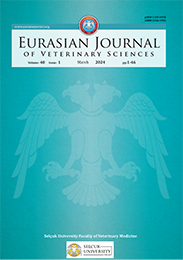| 2024, Cilt 40, Sayı 2, Sayfa(lar) 081-087 |
| [ Türkçe Özet ] [ PDF ] [ Benzer Makaleler ] |
| Effects of Testosterone Undecanoate Treatment on Serum Biochemical Parameters in New Zealand Rabbits |
| Beyza Suvarikli Alan1, Avni Camgoz1, Mustafa Orhun Dayan2, Seyfullah Haliloglu1, Nida Karakaya3 |
| 1Selçuk University, Faculty of Veterinary, Department of Biochemistry, Konya, Türkiye 2Selçuk University, Faculty of Veterinary, Department of Anatomy, Konya, Türkiye 3Batman University, Vocational School of Technical Sciences, Department of Veterinary Medicine, Batman, Türkiye |
| Keywords: Serum, Rabbit, Testosterone undecanoate |
| Downloaded:74 - Viewed: 406 |
|
Aim: Anabolic androgenic steroids (AAS), used to treat various diseases, are
also doping substances for athletes to improve their sportive performance.
The aim of this study is to evaluate some serum biochemical parameters in
New Zealand rabbits treated with long-term Testosterone Undecanoate (TU).
Materials and Methods: In the present study, 21 male New Zealand rabbits aged 5-6 weeks were divided into 3 groups; control, castor oil group, and TU group (in which TU was diluted in castor oil). In the Castor oil and TU diluted in castor oil (10 mg/kg) were injected intramuscularly in 0.1 ml for 6 weeks, 5 days a week in the related groups. Results: The results of the study, in which a total of 22 biochemical parameters were evaluated, showed that aspartate aminotransferase, amylase, triglyceride, total cholesterol, total protein, creatinine, uric acid, phosphate, potassium, sodium, calcium, and glucose levels were statistically significantly higher in the TU group than in the control and castor oil groups, and high-density lipoprotein levels were significantly lower in the other groups compared to the control group. Conclusion: In conclusion, it can be stated that TU administration may adversely affect serum biochemistry in New Zealand rabbits and multidisciplinary studies with different testosterone analogues should be performed. |
| [ Türkçe Özet ] [ PDF ] [ Benzer Makaleler ] |




